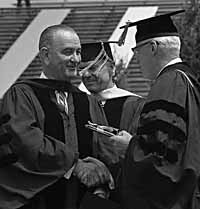When a commencement talk energized a nation

... [As a result of the recent controversies involving commencement speakers] we could head down a road where parents and students congregate to hear a few jokes and milquetoast comments before heading home with their degrees.
This would be a loss. In fact, sometimes commencement speeches have been the venue to introduce bold ideas to the American public.
Fifty years ago, toward the end of May 1964, President Lyndon Johnson -- just six months after becoming president following the assassination of JFK -- stepped up to the podium at the University of Michigan. On a bright sunny day, Johnson spoke to about 85,000 people who were packed into Michigan stadium, celebrating the class of '64, to introduce them to the idea of a Great Society, an idea that would guide a transformation in public policy that lives on today.
The speech had been a long time in the making. For months Johnson had been struggling to come up with a concept that would describe his legislative agenda. Richard Goodwin, who had worked as a special counsel to the House Legislative Oversight Committee that had investigated the quiz show scandal in 1959 and who had worked as a speechwriter for President Kennedy, was given the task of solving Johnson's problem.
Goodwin had kept a close eye on the growing ferment on the college campuses in the early 1960s, including the establishment of the left-wing Students for a Democratic Society which was committed to achieving civil rights and participatory democracy. Goodwin met with the best experts he knew to come up with a phrase that summed up Johnson's program.
Princeton historian Eric Goldman, whom Johnson had recruited as an adviser, said that Johnson should focus public attention on issues other than economic growth. He mentioned the title of a book by the journalist Walter Lippmann, called "The Good Society." Goodwin shared the concept with adviser Bill Moyers who then used it in a number of smaller speeches for LBJ leading up to the graduation.
On May 22, 1964, Johnson delivered his 20 minute commencement address, which was only finished the night before, to the exuberant students at Michigan. The speech was a smash hit. The students interrupted Johnson several times to applaud.
Johnson told the students that the nation had the possibility of reaching beyond merely being a "rich" and "powerful" society to becoming a "Great Society" that delivered something more....